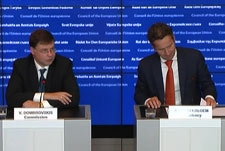 |
|
Top story
|

|
|
Council approves country-specific recommendations; closes excessive deficit procedures for Cyprus, Ireland and Slovenia
|
|
On 17 June, the Council approved draft recommendations and opinions on the Member States’ economic and fiscal policies, the country-specific recommendations (CSRs). The Council also closed the Excessive Deficit Procedure (EDP) for Cyprus, Ireland and Slovenia as these countries have brought their deficits below the 3% of GDP Treaty reference value in 2015 and each country’s correction is expected to be durable. Approval of the CSRs is a key stage in the European Semester, the EU’s annual policy monitoring process. The 2016 CSRs, which were published on 18 May, set out the Commission’s economic policy guidance for individual Member States for the next 12 to 18 months. In addition to efforts already identified and on going at the Euro area level, the guidance focused on priority reforms to strengthen the recovery of Member States’ economies by boosting investment, implementing structural reforms and pursuing fiscal responsibility. Recommendations covering economic, fiscal and employment policies will be referred to the European Council for endorsement at its meeting on 28 and 29 June, and be formally adopted by the Council on 12 July, thus concluding the 2016 European Semester.
|
|
|
|
 |
|
 |
|
More News
|

|
|
Council agrees on far-reaching new rules to reduce corporate tax avoidance; sets out roadmap for completing Banking Union
|
|
On 21 June, EU finance ministers agreed on a draft directive addressing corporate tax avoidance. These legally-binding rules are part of the Commission's January 2016 package of proposals aimed at preventing tax avoidance by corporate groups that take advantage of disparities between national tax systems large companies. The draft directive builds on 2015 OECD recommendations to address tax base erosion and profit shifting. Specifically, it will discourage the transfer of interest to low-tax jurisdictions; prevent tax base erosion when assets are transferred to a low-tax jurisdiction; close off abusive tax arrangements; discourage the reattribution of income from low-taxed foreign subsidiaries; and implement rules on hybrid mismatches between national tax systems. Ministers also agreed on 17 June on a roadmap for further work to complete the Banking Union. Work will be conducted on a European deposit insurance scheme; a common backstop to the single resolution fund; and designing bank regulations to reduce risks.
|
|
|
|

|
|
Portugal post-programme surveillance mission recalls importance of increasing the flexibility and competitiveness of the Portuguese economy
|
|
Staff from the European Commission, in liaison with staff from the European Central Bank, visited Portugal from 15-22 June to conduct the fourth post-programme surveillance mission. This visit also served as specific monitoring in the framework of the EU Macroeconomic Imbalance Procedure. Since the conclusion of the third post-programme surveillance mission in early February 2016, the pace of Portugal’s economic recovery has fallen short of expectation, thereby increasing the downside risks to the fiscal outlook, while financing conditions have worsened. The pace of the recovery continues to be held back by the high indebtedness of all sectors in the economy and rigidities in labour and product markets. In addition to substantially reducing public and private debt, Portugal needs to enhance the flexibility and competitiveness of its economy in order to increase its resilience to shocks and improve its growth prospects.
|
|
|
|

|
|
Investment Plan for Europe: financing deals for SMEs signed in Croatia and Germany
|
|
The European Investment Fund (EIF) signed two agreements on 22 June to benefit small and medium sized businesses, both of which benefit from the support of the European Fund for Strategic Investments (EFSI), the heart of the Investment Plan for Europe. The deals include the first EFSI deal for SMEs in Croatia. The agreement signed by the EIF and HBOR with the support of the Investment Plan will help SMEs access HRK 150 million (EUR 20 million) of fresh loans. Meanwhile in Berlin, the EIF and NRW.BANK along with six regional promotional banks signed an InnovFin agreement to provide EUR 110 million of loans to innovative companies in seven federal states in Germany.
|
|
|
|

|
|
2016 Convergence Report: progress made but no Member State meets all conditions for euro adoption
|
|
The Commission has published the 2016 Convergence Report, which assesses Member States’ progress on moving towards euro adoption. This year’s report was released on 7 June and covers the seven Member States that are legally committed to adopting the euro: Bulgaria, the Czech Republic, Croatia, Hungary, Poland, Romania and Sweden. The report is based on the convergence criteria, sometimes referred to as the ‘Maastricht criteria’, set out in article 140(1) of the Treaty on the Functioning of the European Union (TFEU). The criteria include price stability, sound public finances, exchange rate stability and convergence in long-term interest rates. The compatibility of national legislation with Economic and Monetary Union (EMU) rules is also assessed. The report concludes that the seven Member States have made progress with convergence, but none of them currently meet all conditions for euro adoption. In a separate Convergence Report that was also released on 7 June, the European Central Bank assessed the same seven Member States for their degree of economic convergence and compliance by their national central banks with the statutory requirements to join the Eurosystem.
|
|
|
|

|
|
Annual inflation up to -0.1% in the euro area and in the EU
|
|
Euro area annual inflation was -0.1% in May 2016, up from -0.2% in April. In May 2015 the rate was 0.3%. EU annual inflation was also -0.1% in May 2016, up from -0.2% in April. A year earlier the rate was 0.3%. These figures come from Eurostat, the statistical office of the EU. In May 2016, negative annual rates were observed in sixteen Member States. The lowest annual rates were registered in Romania (-3.0%), Bulgaria (-2.5%) and Cyprus (-1.9%). The highest annual rates were recorded in Belgium (1.6%), Malta (1.0%) and Sweden (0.8%). Compared with April 2016, annual inflation fell in nine Member States, remained stable in eight and rose in eleven. The largest upward impacts to euro area annual inflation came from restaurants & cafés (+0.12 percentage points), rents and tobacco (both +0.07 pp), while fuels for transport (-0.53 pp), heating oil
(-0.20 pp) and gas (-0.13 pp) had the biggest downward impacts.
|
|
|
|

|
|
GDP up by 0.6% in the euro area and by 0.5% in the EU
|
|
Seasonally adjusted GDP rose by 0.6% in the euro area and by 0.5% in the EU during the first quarter of 2016, compared with the previous quarter, according to an estimate published by Eurostat, the EU statistical office. In the fourth quarter of 2015, GDP grew by 0.4% and 0.5% respectively. Compared with the same quarter of the previous year, seasonally adjusted GDP rose by 1.7% in the euro area and by 1.8% in the EU in the first quarter of 2016, after +1.7% and +2.0% respectively in the previous quarter. Among Member States for which data are available for the first quarter of 2016, Romania (+1.6%), Cyprus (+0.9%), Spain, Lithuania, Austria and Slovakia (all +0.8%), Bulgaria and Germany (both +0.7%) recorded the highest growth compared with the previous quarter. Decreases were registered in Hungary (-0.8%), Greece (-0.5%) and Poland (-0.1%), while GDP in Estonia remained stable. Household final consumption expenditure had a positive contribution to GDP growth in both the euro area and the EU (+0.3 and +0.4 percentage points), as did gross fixed capital formation (+0.2 pp and +0.1 pp). The contribution of the external balance to GDP growth was negative for both areas, while the contribution of changes in inventories was positive.
|
|
|
|
|
|
 |
|












